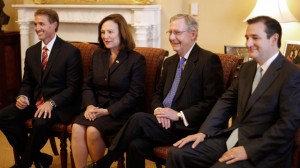The fiscal cliff negotiations aren’t the only debt consolidation talks going on in our nation’s capitol this week. The campaign may be over but the committees to re-elect are still fundraising — not for 2014 or 2016 — but to cover their 2012 debts.
Two days after Election Day, Roll Call reporter Janie Lorber noted that lawmakers “[e]ager to retire campaign debt and prepare for the next election cycle… will split their time between debt talks and dozens of fundraisers.”
The events cost anywhere from $500 to $2,000 a head, although some lobbyists who made contributions in the final weeks of a campaign attend events — held at the Capitol Hill Club and the Capital Grille among other swanky spots — at no charge. …
Most new members of Congress will come to town with at least some debt from their campaigns, and early fundraisers present a prime opportunity for lobbyists get to know the newest faces on Capitol Hill.
According to Sunlight’s Political Party Time blog, there are nearly 30 fundraising events taking place in the nation’s capitol this month, including a victory reception for Sen-elect Deb Fischer (R-Neb.) and a lunch for Senator Jerry Moran (R-Kan.), both of whose campaign committees are in the red.

Senate Minority Leader Mitch McConnell of Ky., second from right, meets with newly elected GOP Senators, Tuesday, Nov. 13, 2012, on Capitol Hill in Washington. From left are, Sen-elect Jeff Flake, R-Ariz., Sen-elect Deb Fischer, R-Neb, McConnell, and Sen-elect Ted Cruz, R-Texas. (AP Photo/Pablo Martinez Monsivais)
Of the 85 new members of Congress elected last week, 60 ran campaigns that are currently in debt. If a candidate donates his or her own money to the campaign, it counts as debt because that contribution is technically considered a loan. One way self-financiers can erase the debt is to write off the loan. It’s not yet clear how many of this year’s freshman members fall into that category, but this election’s most notorious self-financier is probably Connecticut’s Linda McMahon, who gave a total of $97 million of her own money toward her two unsuccessful runs for Senate.
But the biggest deadbeats on the campaign trail are the also-ran presidential candidates. Politico‘s Dave Levinthal observed in October that “A gaggle of former Republican presidential candidates dedicated to slashing the national debt have failed to pay off their own.”
Chief among them: Newt Gingrich, whose campaign owed more than $4.9 million as of Sept. 30 to dozens of different creditors, new federal records show.
Unpaid bills for telemarketing, travel, advertising, ballot fees, event production, Web hosting, equipment rentals and consulting and legal services rank among the reasons for the debt.
Levinthal goes on to chronicle all the 2012 Republican presidential candidates’ debts, as well as some from campaigns that are distant memories: Alan Keyes’ 2000 run ($301,144), Hillary Clinton’s 2008 run ($73,000) and even her husband’s 1996 primary committee ($100,000) — although Bill Clinton’s committee disputes this.
But as newly elected members and senators make their way to Washington to learn the ropes and pass through them (the velvet ones), Sunlight Party Time blogger Louis Serino wryly observes that “elections are won and lost, politicians come and go, but fundraisers are forever.”

